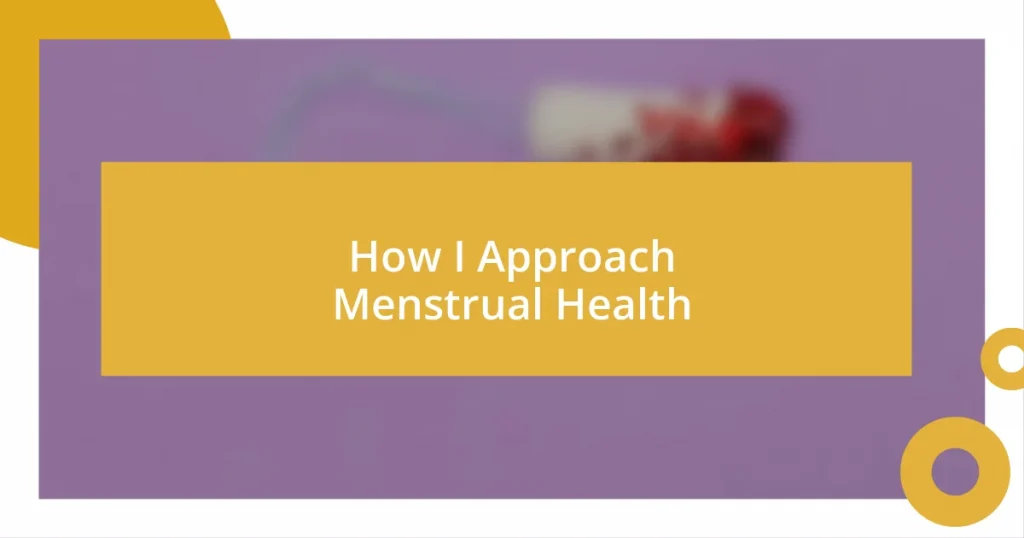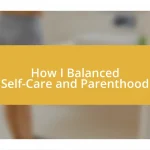Key takeaways:
- Understanding menstrual health involves recognizing the physical, emotional, and social dimensions, emphasizing the importance of education and breaking stigma.
- Tracking menstrual cycle phases and symptoms allows individuals to anticipate changes and manage emotional and physical experiences more effectively.
- Seeking professional help when necessary can provide valuable insights and tools for managing menstrual health, reinforcing the notion that support is key to holistic well-being.
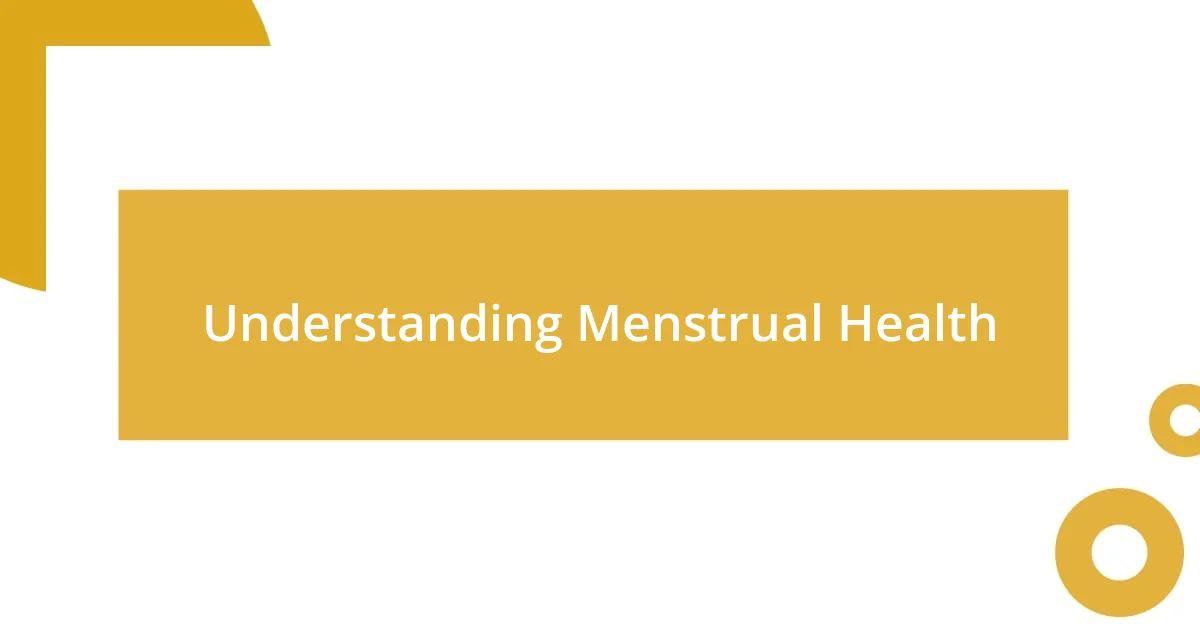
Understanding Menstrual Health
Menstrual health encompasses the physical, emotional, and social aspects of menstruation. I remember the first time I experienced my period; it was a mix of confusion and embarrassment. I often wonder, how can something so natural carry such stigma? This emotional weight can affect how we perceive menstrual health.
Understanding menstrual health isn’t just about managing cycles but also recognizing how it connects to our overall well-being. For instance, I’ve noticed that lifestyle factors, like diet and stress, directly impact how I feel during my cycle. Have you ever considered how your own habits shape this experience? It’s a crucial aspect often overlooked but vitally important.
Additionally, menstrual health education plays a significant role in how we navigate our cycles. When I finally sought information beyond what was taught in school, I felt empowered rather than anxious. Isn’t it fascinating how knowledge can transform our experience? By opening up conversations about menstrual health, we can break barriers and support one another in this journey.
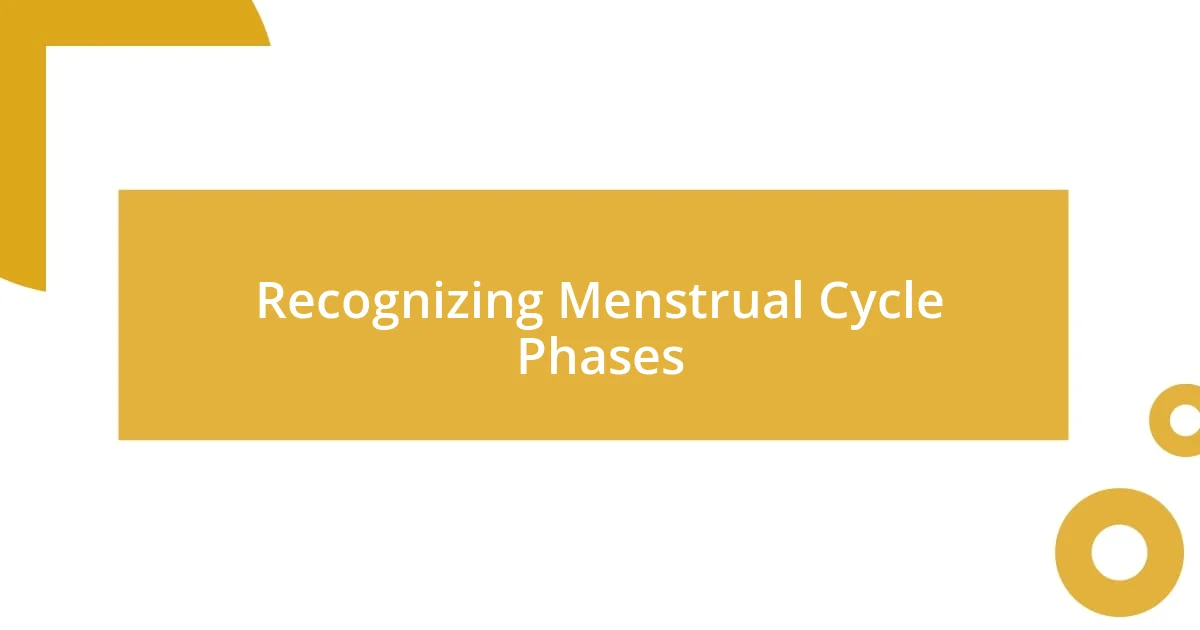
Recognizing Menstrual Cycle Phases
Recognizing the phases of the menstrual cycle has been a game-changer for me. The cycle is typically divided into four phases: menstrual, follicular, ovulatory, and luteal. Each phase brings different emotional and physical experiences, which I now pay attention to. For example, during the ovulatory phase, I often feel a surge of energy and confidence, making it a great time for social activities. Have you noticed how your mood shifts at different times?
I remember the first time I actively tracked my cycle; I was surprised to see patterns emerge. It helped me anticipate how I would feel in the days leading up to my period and how to manage those emotions. By recognizing these phases, I’ve learned to adapt my lifestyle—a lighter workout during menstruation feels much better, while more intense activities align perfectly with my ovulation. Learning about the cycle phases helped me reclaim some control over my life.
Here’s a simple comparison to illustrate the phases of the menstrual cycle:
| Phase | Duration | Physical Symptoms | Emotional Insights |
|---|---|---|---|
| Menstrual | Days 1-5 | Cramping, bloating | Introspection, fatigue |
| Follicular | Days 6-14 | Energy increase | Optimism, motivation |
| Ovulatory | Days 15-17 | Heightened energy | Confidence, sociability |
| Luteal | Days 18-28 | PMS symptoms | Emotional sensitivity |
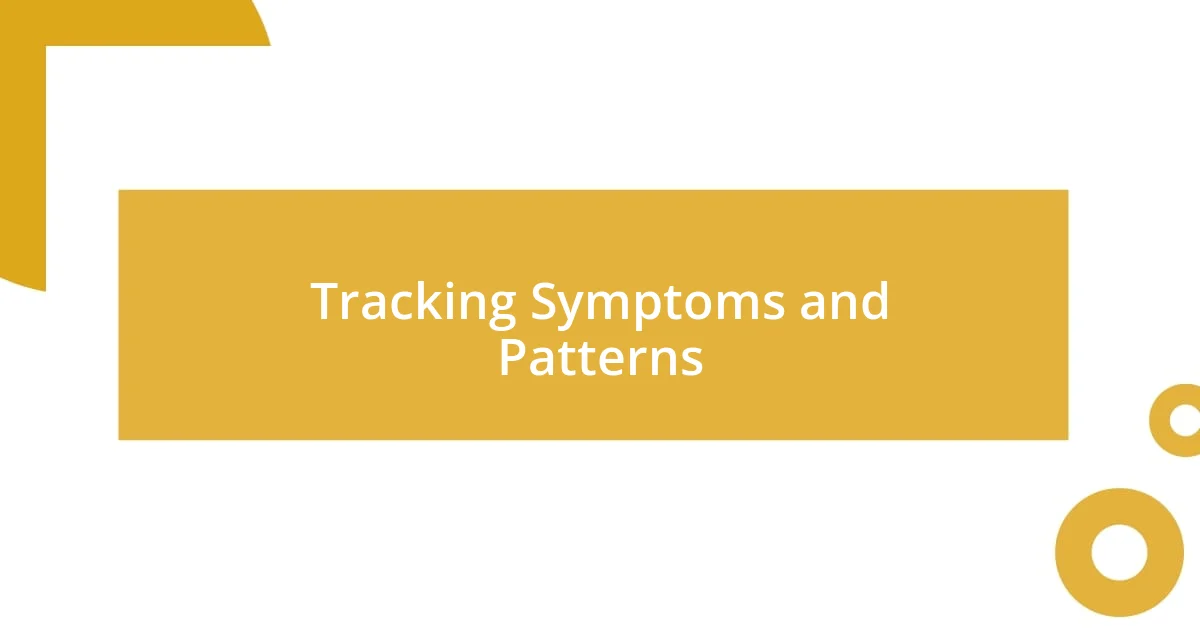
Tracking Symptoms and Patterns
Tracking symptoms and patterns has become an invaluable part of my menstrual health journey. Each month, I diligently note my physical and emotional changes, which has helped me understand the nuances of my cycle. The act of writing down these experiences has turned the abstract feelings of discomfort into something concrete and manageable. I used to be overwhelmed by mood swings, but now I can predict and prepare for them.
Here are some key symptoms and patterns I track:
- Cramping: I note the severity and duration.
- Mood Swings: I track my emotional highs and lows.
- Energy Levels: I observe fluctuations in my energy throughout the cycle.
- Sleep Quality: I analyze how my sleep varies with different phases.
- Physical Symptoms: Any changes in appetite, bloating, or skin condition.
Establishing this habit has not only provided clarity but also fostered a deeper connection with my body. I recall the first time I realized that my increased irritability correlated with the luteal phase. It instantly made sense why those days felt so heavy. Getting in tune with these patterns has allowed me to devise strategies—like scheduling lighter activities or meditative practices—to support myself during emotionally challenging times. It feels empowering to turn what was once a chaotic experience into a predictable rhythm.
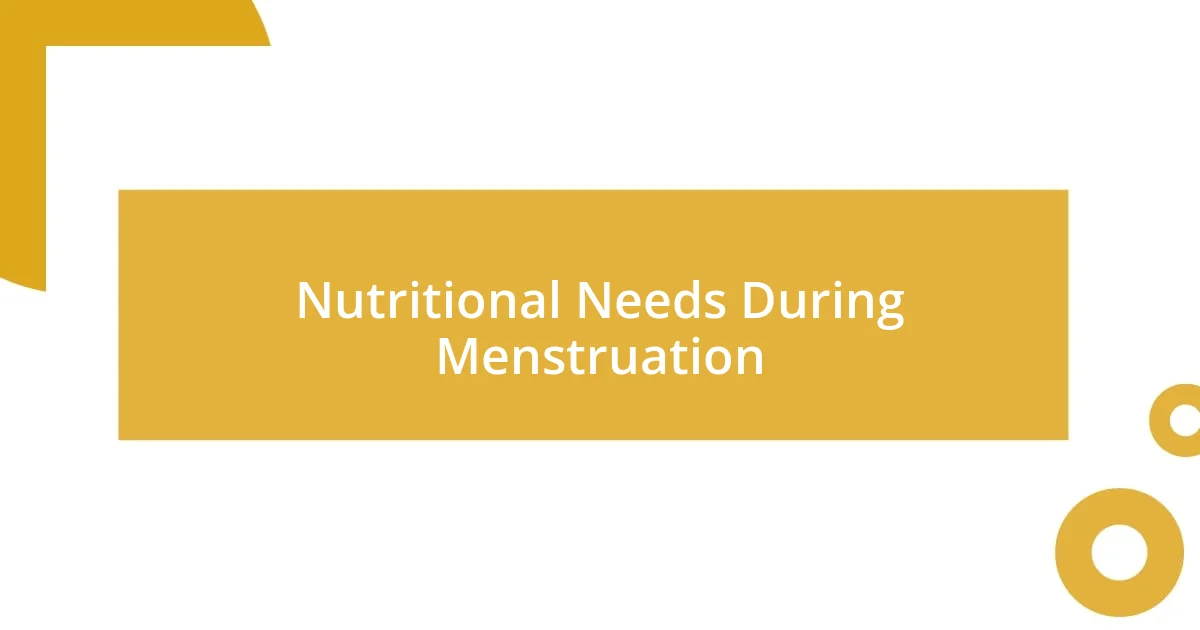
Nutritional Needs During Menstruation
Navigating nutritional needs during menstruation has been quite the journey for me. I’ve discovered that focusing on iron-rich foods is crucial, especially when I’m losing blood during my period. Incorporating spinach, lentils, and quinoa has made a noticeable difference in my energy levels, reminding me how essential it is to listen to my body. Have you ever felt drained after your period? I certainly have, and addressing this with the right foods has transformed that experience.
During my luteal phase, I often find cravings creeping in, which is entirely normal. Rather than depriving myself, I indulge in healthy snacks like dark chocolate and nuts, which not only satisfy my sweet tooth but also provide magnesium and healthy fats. I remember one evening, feeling the familiar pull of those cravings, and instead of succumbing to a guilt trip, I opted for a handful of mixed nuts. It satisfied my cravings while keeping my mood stabilized. What do you reach for when those cravings hit?
Hydration is another aspect I can’t overlook during my cycle. I’ve made it a habit to drink herbal teas, particularly ginger or chamomile, to soothe discomfort and promote relaxation. I recall a time when bloating left me feeling sluggish, and a warm cup of ginger tea worked wonders. It’s little adjustments like these that remind me how powerful nutrition can be in managing not just physical symptoms but emotional ones as well.
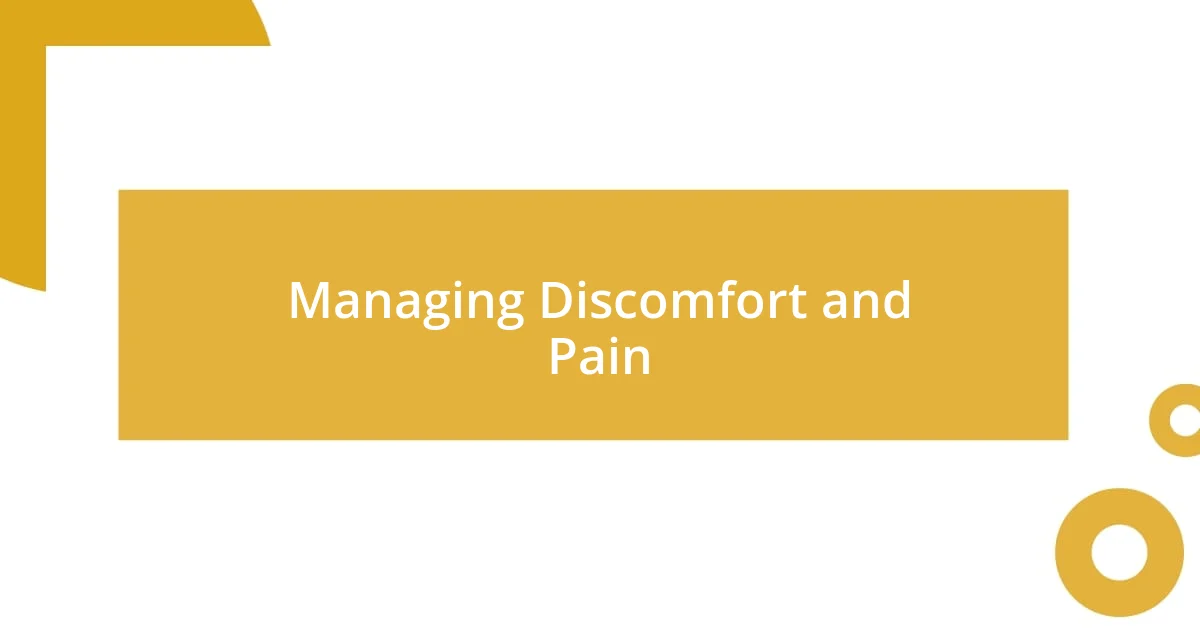
Managing Discomfort and Pain
Managing discomfort and pain during my menstrual cycle has developed into a personalized routine that really works for me. I make it a point to incorporate gentle movement, like yoga or stretching, which I find greatly alleviates cramping. I can recall one particularly painful day where a simple 15-minute yoga session transformed my experience, allowing me to breathe through the tension instead of feeling overwhelmed by it. Have you ever noticed how movement can shift your perspective on discomfort?
Heat therapy is another method I rely on to ease cramps. Whether it’s a hot water bottle or a warm bath, I find that the heat relaxes my muscles and provides relief. I still vividly remember a night when I was struggling to fall asleep due to intense cramps. After a warm bath, I felt my body relax, and it was as if I could finally breathe again. It’s those small yet significant moments of comfort that genuinely make a difference. What are some techniques you’ve discovered that help you unwind?
Pain relief medications play their role, too, though I prefer to use them sparingly. I’ve learned how to listen to my body and only reach for over-the-counter pain relief when absolutely necessary. When I do, I take the time to assess my symptoms—are they steadily worsening, or can a little patience get me through? Once, I tried waiting through a particularly frustrating bout of pain, and to my surprise, managing it with just heat and breathing exercises was a game changer. It taught me to be more attuned to what my body truly needs. What do you find works best when you’re navigating pain?
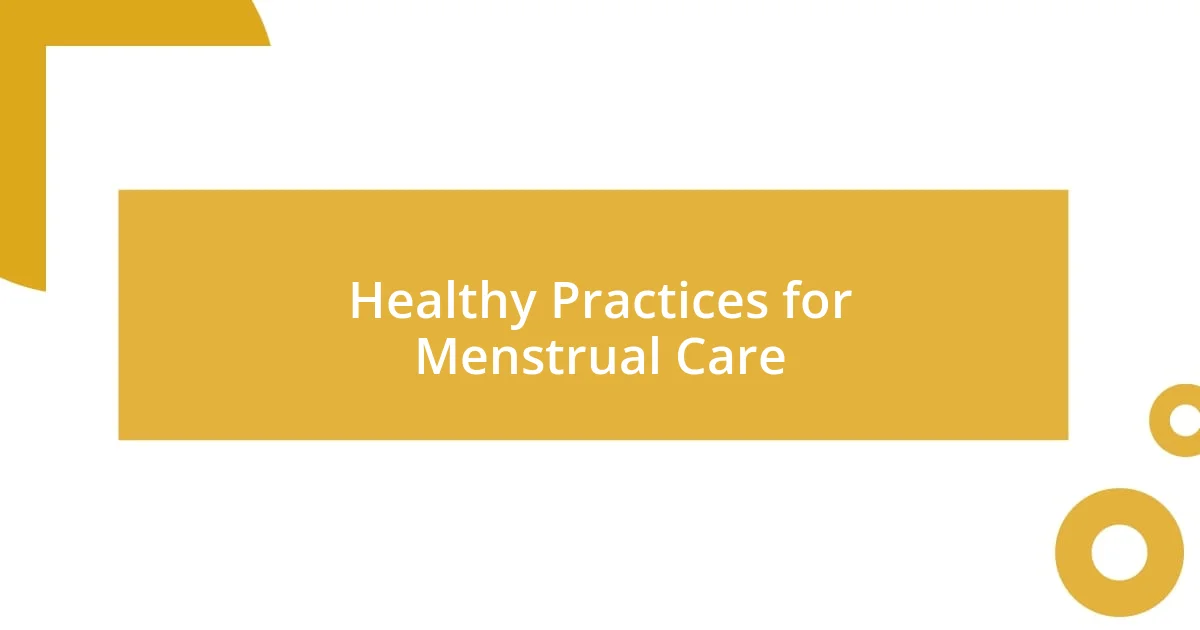
Healthy Practices for Menstrual Care
Eating well is just the beginning of my journey with menstrual care. I’ve found that prioritizing my mental health during this time is equally essential. When I feel the emotional rollercoaster that often accompanies my cycle, I try to carve out moments for self-care. Whether it’s journaling my thoughts or indulging in a good book, those little acts help ground me. Has there been a simple pleasure that has lifted your spirits during your cycle?
Another practice I embrace is tracking my cycle. By using an app, I can keep a close eye on my mood, symptoms, and overall well-being. I recall a month where I noticed my energy dipped significantly during the same phase, and documenting it helped me connect the dots. This really empowered me to plan my days better, whether that meant taking it easier or scheduling social activities on higher-energy days. Do you track your cycle, and if so, how has it influenced your daily life?
Lastly, I’ve learned the importance of open communication. Talking with friends or even communities about our experiences can be incredibly validating. I remember a heart-to-heart with a friend, where we shared our struggles and remedies. That conversation not only lightened my heart but also introduced me to new ideas for managing discomfort. Engaging with others reminds me I’m not alone in this journey. How often do you find yourself seeking support during your menstrual health experiences?

Seeking Professional Help When Needed
Recognizing the right moment to seek professional help has been a pivotal aspect of my menstrual health journey. I recall a time when my cramps seemed to spiral beyond the usual discomfort, leaving me exhausted and frustrated. That’s when I decided to consult a healthcare provider. It was reassuring to have that conversation, and I left with new tools and strategies that helped me regain control. Have you ever felt a weight lifted just by talking to a professional?
Sometimes, the emotional aspects of menstruation can be just as daunting as the physical ones. I’ve experienced cycles where mood swings left me feeling isolated, prompting me to explore therapy sessions focused on emotional well-being. These discussions changed my perspective on how I should approach my cycle, teaching me that seeking assistance is not a sign of weakness, but rather a step towards holistic health. Isn’t it empowering to know that there’s support available for every aspect of our well-being?
I’ve also learned that not all menstrual health concerns are straightforward. There was a period when I endured severe fluctuations in my cycle, which I initially dismissed. After seeking help, I discovered an underlying condition that required a tailored approach. It felt like unlocking a door to understanding my body better. This reinforced my belief that engaging with professionals isn’t just about problem-solving—it’s about partnering in my health journey. How have your experiences shaped your views on reaching out for professional advice?









